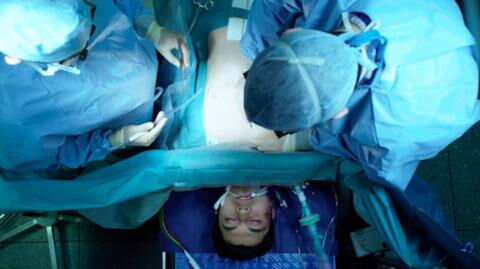Researchers may have discovered the reason why some people have near-death experiences (NDEs). Scientists from the University of Michigan have studied the phenomenon, discovering a spike in brain activity at the time of death. The study was published in the Proceedings of the National Academy of Science.
Discover our latest podcast
Surge in brain activity could explain near-death experiences
Jimo Borjigin, an associate professor in the Department of Molecular & Integrative Physiology and the Department of Neurology at the University of Michigan, led the research, which expanded upon earlier data that found a neural surge in the brains of dying animals. Prof. Borjigin told Medical News Today:
We were postulating that [the surge] may represent neural correlates of consciousness that could potentially link the subjective experiences of people who survive cardiac arrest.
The researchers studied the brain activity of four people who passed away in hospitals while being monitored by an EEG (electrogram) device.
At the time of death, brain activity was identified in the temporoparietal junction (TPJ), the region where the temporal, parietal, and occipital lobes meet in the back of the brain.
The TPJ is already connected to dreams, hallucinations, and altered states of consciousness. Prof. Borjigin said:
I really wanted to be able to define something in the brain that can potentially explain that subjective near-death experience. Some of these patients might have if they had survived to tell their stories, but unfortunately they didn’t.
Did medical equipment capture a near-death experience (NDE) in the brains of two very different coma patients after they were removed from life support? https://t.co/qWUFPaG21m
— Discover Magazine (@DiscoverMag) May 20, 2023
Read more ⋙ Nurse reveals the most common last words and regrets of dying people
Are near-death experiences due to covert consciousness?
This increased brain activity could assist in explaining NDEs. While the patients weren't visibly conscious, the surge in brain activity indicated 'covert consciousness'. That is, even as the heart stops beating, consciousness can still be active. Prof. Borjigin explained:
[People who’ve had near-death experiences] may remember seeing or hearing things, or having an out-of-body experience or motion perception as if they’re flying. I think that we have potentially at least defined or discovered minimum anatomical steps to neurosignatures of covert consciousness.
We’d like to be able to study human subjects under less devastating circumstances, where the patients are known to be able to survive and then tell the story where they can correlate their brain signature with a subjective experience.
Read more:
⋙ Woman who died for 14 minutes reveals what she experienced
⋙ Man who died for 20 minutes reveals what he experienced
Near-death experiences could be result of damage to TPJ
Meanwhile, Dr Jane Aspell, an associate professor of cognitive neuroscience at Anglia Ruskin University, agrees on the important role of the TPJ. She believes NDEs could be associated with damage to this region of the brain.
Dr Aspell explained that near-death experiences were 'very vivid, very real hallucinations'. She said:
There is now strong evidence that out of body experiences, and related experiences, are caused by abnormal functioning in parts of the brain that process and combine signals from our bodies.
Recent research on neurological patients has shed light on how the healthy brain generates the experience of one's self, and what happens when that construction temporarily goes 'wrong'.
Dr Aspell added:
It seems to make sense then that if this area is not functioning as it should, this integration of all of these different signals will not occur as it should, so the experience of being one single body might therefore be disrupted.
This could potentially lead to the out-of-body experiences people often report, when they are floating above their own bodies, for example.
Sources used:
Medical News Today: 'Study finds evidence of increased brain activity in people right before they die'
Good News Network: 'Scientists Find Surge of Specific Brain Activity in Dying Patients that Could Help Explain Near-Death Experiences'
Mirror: 'Expert shares fascinating insight into why some people have near-death experiences'















